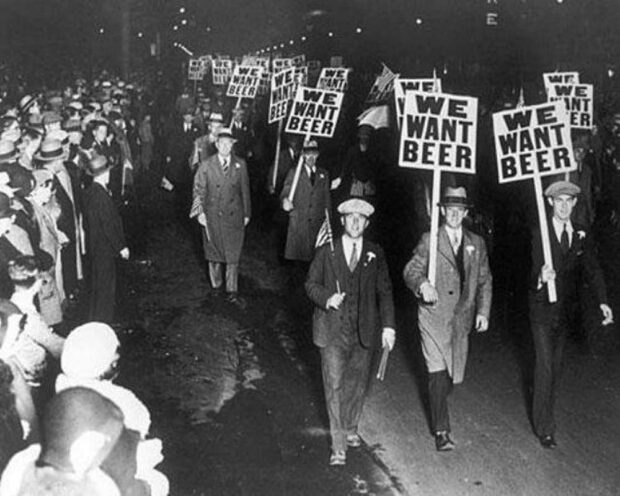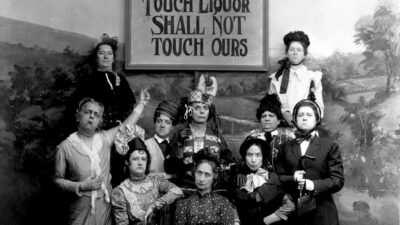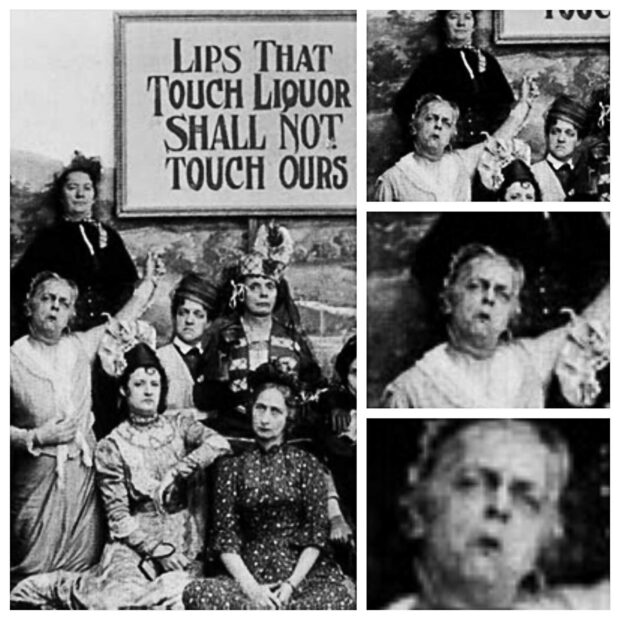Need ten reasons to drink? Take a look at the ten ladies in this Prohibition poster from 1919. They proudly position themselves in front of a sign that says “Lips that touch liquor, shall not touch ours!” Using sex as collateral, the goal of the photo is to convince husbands everywhere to stop drinking beer, wine, and liquor, or risk celibacy in their bedrooms.
Who Are The Prohibition Ladies In The “Lips That Touch Liquor Shall Not Touch Ours” Photo?

Who are the “lovely” Prohibition ladies that almost look like drag queens in this poster?
According to a Reddit thread about this photo, the woman on the left who is pointing to the Prohibition sign that reads “Lips That Touch Liquor Shall Not Touch Ours”, is the notorious Carrie Nation. Nation was a radical American temperance activist and early leader of the Women’s Christian Temperance Union (WCTU). She was known for her fiery speeches and her use of a hatchet to destroy bottles of alcohol. Her famous use of an axe earned her the nickname Hatchet Granny.
If you were alive during Prohibition and came upon this photo, I mean seriously, do you think this would convince men to quit drinking? What would you rather do, kiss one of these women or drink a beer?
This Terrible Prohibition Poster Likely Had The Opposite Intended Effect Share on XThe Rise And Fall Of Prohibition

In the United States, the term “Prohibition” refers to the period 1920 to 1933, during which the sale, manufacture, and transportation of alcohol for consumption were banned nationally as mandated in the Eighteenth Amendment to the United States Constitution.
Following significant pressure on lawmakers from the Temperance Movement, the United States Senate passed the Eighteenth Amendment on December 18, 1917. The “Volstead Act,” the name for the National Prohibition Act, passed Congress over President Woodrow Wilson’s veto on October 28, 1918, and established the legal definition of intoxicating liquor as well as providing for enforcement of Prohibition.
As Prohibition became increasingly unpopular during the Great Depression, especially in large cities, “Repeal” was eagerly anticipated. On March 23, 1933, President Franklin Roosevelt signed into law an amendment to the Volstead Act known as the Cullen-Harrison Act, allowing the manufacture and sale of certain kinds of alcoholic beverages. The Eighteenth Amendment was repealed with ratification of the Twenty-first Amendment, on December 5, 1933.

Frank Wilson is a retired teacher with over 30 years of combined experience in the education, small business technology, and real estate business. He now blogs as a hobby and spends most days tinkering with old computers. Wilson is passionate about tech, enjoys fishing, and loves drinking beer.


















 Why Sloth from The Movie Goonies is still my favorite character
Why Sloth from The Movie Goonies is still my favorite character
Leave a Reply
You must be logged in to post a comment.